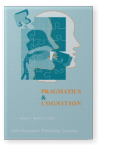Vol. 1:2 (1993) ► pp.245–266
Passionate thought
Computation, thought and action in Hobbes
According to a computational view of mind, thinking is identified with the manipulation of internal mental representations and intelligent behavior is the output of these computations. Although Thomas Hobbes's philosophy of mind is taken by many to be a precursor of this brand of cognitivism, this is not the case. For Hobbes, not all thinking is the manipulation of language-like symbols, and intelligent behavior is partly constitutive of cognition. Cognition requires a 'passionate thought', and this Hobbsian synthesis of inner thought and outer behavior suggests a resolution to the contemporary conflict between cognitive theories of mind that make KNOWING THAT primary and pragmatic theories that make KNOWING HOW primary.
Cited by
Cited by 2 other publications
This list is based on CrossRef data as of 8 april 2024. Please note that it may not be complete. Sources presented here have been supplied by the respective publishers. Any errors therein should be reported to them.
